Early diagnosis and treatment of cataracts can help you maintain your vision having a profound effect on your well-being.
Inside the eye is a small lens which helps you see clearly. The lens sits just behind the coloured iris. As you grow older the lens naturally starts to become cloudy, this is called a cataract. The lens will never clear and so will need to be removed to help you see clearly again.
Cataracts can develop gradually so at first your cataract may have little effect on your vision. For others there can be a definable and definite change to vision. Knowing more about the symptoms of cataracts can help you to get an early diagnosis and treatment.
Common cataract symptoms to look out for:
- Cloudy or blurred vision – you may notice difficulty when reading the newspaper or looking to road signs in the distance.
- Problems in bright light – you may find you are more sensitive to light during the day, suffer with glare in bright light (like sun through a dirty windscreen) or glare from lights on a night may be causing difficulty.
- Seeing double – you may see double or multiple images from one eye.
- Poor night vision – you may find it difficult to see when the light starts to fade.
I have some of these symptoms, what next?
If you have experienced any of the symptoms above, it doesn’t necessarily mean that you have cataracts. Book an appointment with one of our ophthalmic surgeons here at My Eye Clinic and they can assess your eyes for cataracts and any other problems.
If you have developed a cataract, your surgeon will develop a personalised treatment plan for your specific needs and will be with you every step of the way through the process.
Cataract surgery
If following your consultation you find that you require cataract surgery, your surgeon will talk you through everything that is involved. Cataract operations are performed under local anaesthetic, the eye will be numbed using drops and/ or an injection and you will be awake throughout the surgery. You should not feel any pain or discomfort.
During surgery, the consultant will replace the cloudy natural lens with a synthetic intraocular lens (IOL) which will last a lifetime. For those who are interested in correcting visual errors such as short-sightedness, long-sightedness or astigmatism, we also offer refractive cataract surgery – just ask your surgeon for more information.
Cataract surgery is one of the safest and most commonly performed surgical procedures in the world. It is a relatively painless, simple procedure which is very successful in restoring vision.
All My Eye Clinic ophthalmologists hold consultant NHS posts and all have undergone additional training in their chosen sub-specialty training within ophthalmology to ensure high-quality care. We have specialists in cornea, cataract, glaucoma, eyelid problems, retinal problems and neuro-ophthalmology. At My Eye Clinic you can be assured your eye care is in good hands.
Contact us today to book your consultation on 0191 9178887.
When fitted with new hearing aids, the most common comment we get from people is “I can hear the birds singing now!”
There is very little that can compare to immersing yourself in nature and soaking in the sights and sounds. Be it the birds in the trees, the crunch of Autumn leaves below your feet or the lapping of the sea against the shore, the beautiful sounds our planet Earth produces are unparalleled.
To get an understanding of the impact sounds have on our everyday life, we asked the following question:
What is your favourite sound?
“Running water from a river, stream or waterfall. I love the sound of the water trickling!”
“The engine noise from a Mustang!”
“The crunch you get under your feet when walking in deep snow.”
“The sound of raindrops hitting the top of your tent when camping!”
Something that we often overlook is the sheer power that sounds have to transport you back to a time or place, be it the opening credits of your favourite childhood cartoon, a song from your favourite film or perhaps the way Forest Gump claims “life is like a box of chocolates”. Psychologists have long been fascinated with the link between sounds and memory, so much so that there are constantly studies being done around sound. Sounds are used to unlock memories in dementia care, music and sounds seem to be able to reach places in the brain that other forms of communication simply can’t.
Despite sounds, music and noise being so influential in our lives, bringing so much power and joy, it is often taken for granted. We notice most that those presenting with hearing loss have long forgot the usual sounds they used to hear, which is why once their hearing is restored, they are amazed at the things they had been missing!
“I can hear the kettle boiling as soon as I walk into my kitchen!”
If you suspect that you or a loved one is suffering from hearing loss, don’t delay in getting a hearing test. They are free and painless and can be done in around an hour. With the help of a hearing aid you could once again hear your world and the wonderful sounds it makes. Call today on 0191 917 8887 for more information.
Digital eyestrain and poor eye health is on the rise, not surprising with the average Briton now spending seven hours plus in front of a screen each day! Keep your eyes in tip-top condition with our eight tips for healthy eyes …
1. Visit A Good Local Optometrist
Adults should visit at least every two years, if you have a close relative who has Glaucoma you should visit every year from the age of 40. Children should have their first eye test before starting school, this can drastically reduce the chances of developing an untreatable lazy eye in adulthood.
2. Avoid Rubbing Your Eyes
Rubbing your eyes often and vigorously can permanently weaken the cornea which can cause a condition know as keratoconus.
3. Eat The Rainbow
Enjoying a diet rich in brightly coloured fruit and vegetables can help reduce the chances of developing severe macular degeneration.
4. Prevent Computer Screen Discomfort
Simple changes can help reduce dry, uncomfortable eyes from computer screen use. Try lowering the position of your screen and close your eyes for 20 seconds every 20 minutes. Preservative free artificial tears can also help some people.
5. Increase The Quality Of Your Tears
Increasing omega-3 oils, such as oily fish, and introducing flaxseed oil supplements in your diet can reduce the chance of dry eye and increase the quality of your tears.
6. Refresh After A Day In Front Of The Screen
Spending everyday in front of the screen can leave you suffering with blocked oil ducts in the eyelids (meibomian gland dysfunction), resulting in sore, tired, heavy, gritty eyes. Refresh your eyes by placing a hot compress over closed eyelids for 10 minutes, doing this three – four a week can really help refresh the eyes and provide instant relief.
7. Take Care When Removing Eye Make-up
Ingredients, such as petroleum jelly and mineral oil, found in some eye make-up removers have been known to clog pores which can cause discomfort, puffiness and irritation of the eye area, it may also cause infection.
8. Quit Smoking
Smoking increases the risk of developing age-related macular degeneration (AMD) and has been linked to the development of cataracts. It causes harm to the tissue of the eye and doubles your chances of losing your sight, according to the Royal National Institute of Blind People.
We have been fortunate to have another wonderful summer again this year, it has been simply glorious. Yes, we’ve had the occasional rainy day but that helps the garden!
As we look forward to more wonderful long summer days spent outdoors with friends and family we thought we share some of our tips on protecting your eyes in the sun.
Overexposure to UV light increases the risks of eye diseases, including cataracts, growths on the eye and cancer. It can cause damage to the surface of the eye as well as the cornea and lens.
These diseases may take many years to develop, but each time we go out into the sun without protection we could be adding damage and increasing our risks to these serious disorders.
Be eye smart in the sun!
Simple steps you can take to stay safe in the sun and reduce your risk of developing a potentially blinding disease or tumour.
When buying sunglasses, do you check the UV rating? Ensure yours block both UV-A and UV-B rays and are labelled either UV400 or 100% UV protection. Wrap around styles stop the sun’s rays from entering at the side.
If you wear UV-blocking contact lenses, remember they are not protecting your whole eye – you still need sunglasses!
For extra protection, wear a broad-brimmed hat with your sunglasses.
Take extra care in UV-intense conditions such as the mid-day sun, when at higher altitudes and when the sun is reflected off water, ice or snow. Sunlight reflected off sand and water can cause photokeratitis, this condition is responsible for snow blindness.
Ensure you and your family take precautions whenever you are outdoors.
Remember – never look directly at the sun!
We all use sunscreen to protect our skin, don’t forget to protect your eyes as well.
Concerned about damage your eyes may have suffered due to sun exposure – contact us today on 0191 9178887 or book on-line
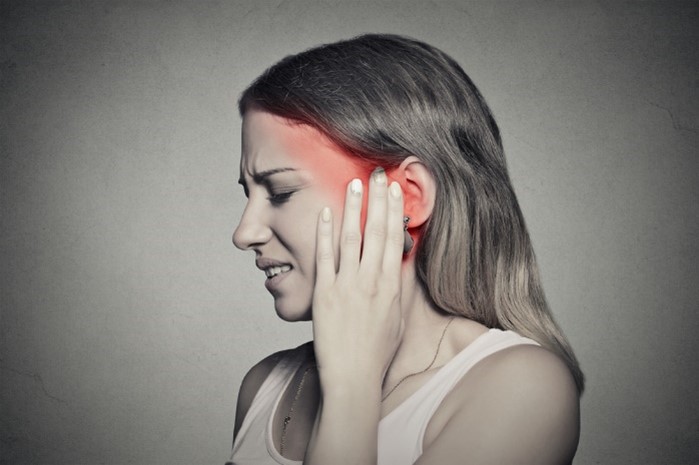
As we approach Tinnitus Awareness Week (1st – 7th February 2021) we thought we’d share some information on the condition and what we can do here in clinic to help you get relief.
Tinnitus is the perception of noises in the head and or ear which have no external source. It is possible to experience tinnitus in one ear (Unilateral tinnitus) or both ears at once. It can begin suddenly or come on gradually. Different people suffer in slightly different ways from tinnitus such as:
- Ringing
- Buzzing
- Hissing
- Throbbing
- Musical
Tinnitus is a condition that most of us have heard of before. In fact, in the UK it affects around 6 million people, with about 600,000 experiencing it to a severity that affects their quality of life.
Although there is sadly no cure for tinnitus there are ways in which we can help to reduce the impact tinnitus can have on your life.
The solution is in fact hearing aids. They don’t just help you hear clearer but do in fact have additional purposes with one being tinnitus management. Starkey’s Multiflex tinnitus technology creates a comforting and customisable sound stimulus that helps mask your tinnitus. This doesn’t eliminate the tinnitus altogether but helps fade it into the background of your day to day tasks. It works in the same way a clock ticks, when you focus on the clock you can hear it tick but as soon as your brain focuses on another sound it fades into the background, appearing to go altogether.
Starkey’s Multiflex tinnitus technology is clinically proven to provide tinnitus relief and with the predicted UK figures of 7.1 million people suffering from tinnitus by 2028, this could be very valuable technology.
We will win this battle against tinnitus.
Livio® AI is the latest offering from global hearing company Starkey Technologies.
Livio AI is the world’s first hearing aid to provide both superior sound quality and the ability to track body and brain health.
Featuring integrated sensors and artificial intelligence, Livio AI can detect if you’ve fallen and act as an assistant.
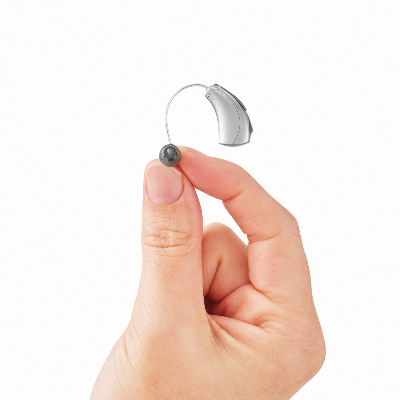
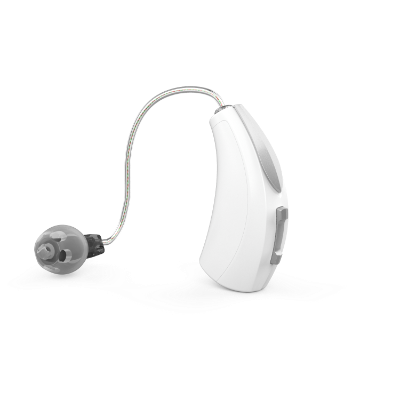
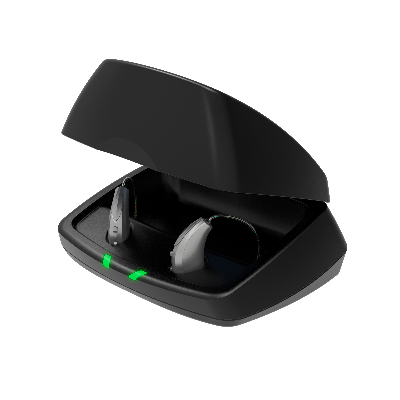
LIVIO FEATURES
FALL ALERT | Thanks to integrated sensors, Livio AI is the world’s first hearing aid that can detect when a hearing aid wearer falls and send alert messages to selected contacts. Users can select Auto Alert or Manual Alert in settings.
SELF CHECK | Self Check is an app-based feature that provides you with a quick and convenient way to find out how your hearing aid system is performing. If an issue is uncovered during the self-check, instructions on how to fix it will appear on your smartphone screen.
TRANSLATE | Communicate effortlessly with people who speak other languages via the easy-to-use translation tool in the Thrive™ Hearing Control app. Choose from 27 available languages, and when you speak into your smartphone, the app will translate your speech and display it on the screen in the other person’s language. When the other person speaks into the phone, the app will translate their speech, display it in your language on the phone, and stream the translated audio to your hearing aids in your language!
TRANSCRIBE | Using the Transcribe option in the Thrive™ Hearing Control app, conversations can be captured and transcribed into text that is displayed on your smartphone. Think of it as closed captioning for real world situations. Imagine asking for directions on a busy street and getting a helpful but complicated answer. With Transcribe, you will have those directions as text that you can easily follow to get where you’re going. You’ll also have the option of saving, texting, copying or emailing the transcribed text.
HEART RATE | COMING SOON
Thanks to a sensor integrated into the hearing aid receiver, you’ll shortly be able to view important heart rate information via the Thrive™ Hearing Control app. You’ll have access to see your latest heart rate measurement, or look back over your heart rate history. You can also see your heart rate recovery, which is the speed at which one’s heart returns to normal after exercise.
RECHARGE AND GO
Livio® AI rechargeable hearing aids are the most capable, full-featured hearing aids enhanced with integrated sensors. They provide a smart, convenient and reliable option, built on rechargeable technology you can trust:
- Longest-lasting Healthable™ rechargeable hearing aid
- Smallest 2.4 GHz rechargeable with integrated sensors
- 24-hour, round-the-clock wear
Livio AI rechargeable hearing aids come with the Starkey® Hearing Technologies Charger. It holds enough charge to provide portable charging three times. LED indicators let you know when your hearing aids are fully charged, and hearing aids turn on automatically when removed from the charger.
Livio AI and Livio rechargeable hearing aids also work with the Starkey® Hearing Technologies Mini Turbo Charger, our new pocket-size, lithium-ion charging option:
- 3.5 hour charge in just seven minutes
- A fully charged Mini Turbo Charger can completely charge a pair of hearing aids four times
Many people tell us they feel less confident as they notice the skin around their eyes age.
Our eyes are typically one of the first things to show our age and once we spot the first signs of ageing, such as wrinkles and droopy eyelids, we start pulling and prodding them in the mirror. We become more aware of the changes and for some of us, this leaves us feeling less confident in our appearance. Our eyes all age at different rates – sun exposure, bone structure and genetics all play a role in how old, or young, our eyes appear.
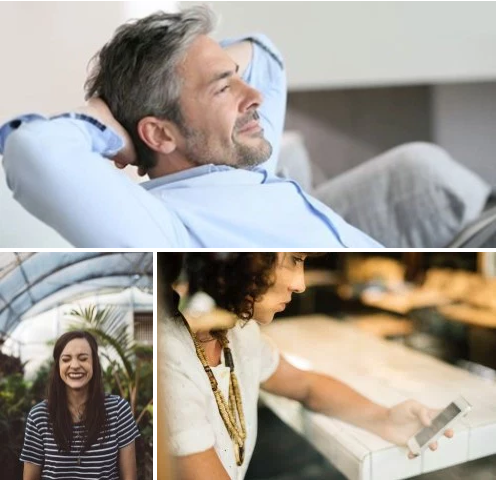
Transform unwanted sagging or baggy eyelids!
Blepharoplasty surgery is common with both men and women who wish to address loose skin on the eyelid – leaving you with a more youthful, rejuvenated appearance. A quick and relatively painless procedure, blepharoplasty is carried out under local anaesthetic. We understand that undertaking any surgery is a big decision, therefore we schedule a one-to-one consultation for you with your consultant prior to surgery to discuss the procedure, suitability for the procedure and any possible risks involved. We ensure all our patients make an informed decision before proceeding with surgery. If you should decide to proceed, an appointment will be scheduled for surgery where your consultant will carefully assess the amount of excess skin before removing, sometimes together with fat. The wound will then be closed using very fine stitches.
Our consulting team have a wealth of expertise and experience, they will develop a personalised treatment plan and be with you every step of the way in your journey. This procedure has minimal downtime with any swelling or bruising usually settling in around 1 – 2 weeks and after around 6 months you should be able to see the final result of your surgery.
How to book your initial consultation
To book your initial consultation, contact us today on 0191 917 8887 where our friendly team will be happy to help. Alternatively, you can pop into our clinic in Gosforth or book online.
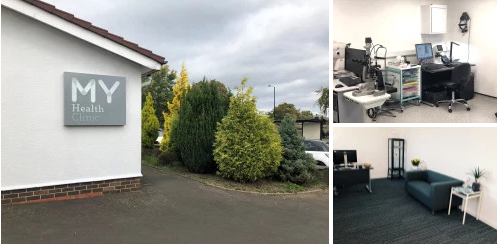
It may not seem the most glamorous of self-care activities, but it could be one of the most crucial. There are 11 million people with hearing loss across the UK (that’s around one in six of us!). More than 40% of people over 50 years old have hearing loss, rising to 71% of people over the age of 70. But this doesn’t mean hearing issues are limited only to a specific age range – infact, around one in 10 UK adults has tinnitus!
We believe everyone should have the right to a thorough hearing test, which is why all of our hearing tests are free! If that wasn’t tempting enough, here are 5 reasons to get your hearing tested…
1- A hearing test is painless, free and takes roughly 60 minutes – 90 minutes.
2- Untreated hearing loss is known to contribute to depression and social isolation.
3- Treating hearing loss with hearing aids has been proven to reduce the risk of cognitive decline
4- Hearing loss that goes untreated can increase your risk of dementia
5- If you have a test and find that your hearing is normal, you can gloat to your family members who’ve been pestering you to get it done!
With expert audiologists and a range of methods to get the most precise picture of your hearing health, not to mention it’s completely FREE, there really is no reason you should shy away from getting your hearing checked. If you don’t have a hearing loss, that’s great peace of mind, and if you do have a hearing loss you will at least be able to make an informed decision on how you’d like to combat that.
Our website hosts a whole load of information if you have further questions or give us a call on 0191 917 8887 if you’d prefer.
It will come as no surprise to hear that as we get older, just like the rest of body, our eyes will change.
From the age of 40 years, many of us will notice our vision beginning to change. Common changes that you can expect to notice include losing the ability to focus on things that are close-up (known as presbyopia); you will notice that it takes longer to adapt to changing light conditions, such as coming indoors on a bright sunny day; noticing that a stronger light is required to see things, such as when reading; you may notice a problem differentiating between some colours. These are all normal and have minimal impact upon your lifestyle.
However, age is also a major risk factor in the development of age-related eye diseases such as cataract, glaucoma, dry eye, macular degeneration and diabetic eye disease.

Unfortunately, we cannot stop the ageing process. We can however definitely reduce the impact the ageing process has upon our vision. We all know the importance of maintaining a healthy lifestyle, diet and exercise are important factors in eye health. Regular exercise will help maintain good circulation and oxygen intake, both of which are important for eye health. Antioxidants such as vitamin A, C and E, together with other nutrients, are great for blood vessels in the eye and may help slow age-related macular degeneration (AMD) and may help prevent cataracts. Maintaining tight blood sugar control for diabetics can reduce the risk of diabetic retinopathy. Reduce the damaging effects of the sun by avoiding harmful ultraviolet light. Ensure your sunglasses block both UV-A and UV-B rays and are labelled either UV400 or 100% UV protection – and remember, your sunglasses are not only for the summer months! Regular eye tests are important. Your optician will pick up eye diseases such as glaucoma and cataract as well as spotting general health problems such as high blood pressure and diabetes. Ensure you have your eyes tested every two years – you may require a more frequent test in certain circumstances, check with your optician.






